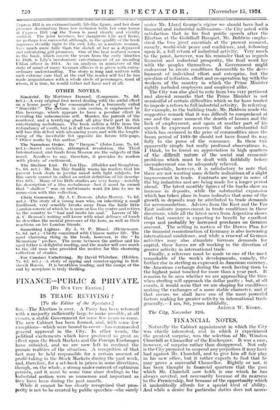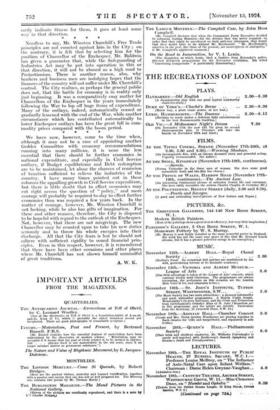FINANCIAL NOTES..
Nat-It-rally the Cabinet appointment in which the -City was chiefly interested, and in which it experienced the greatest surprise, was the selection- of Mr. Winston Churchill as Chancellor of the Exchequer. It was a case, however, .of surprise rather. than disapproval. Not only is the City prepared to suspend any prejudices it may have had against Mr. Churchill, and to give him all fair play in his new office, but it rather expects to find- that he may prove a successful ChanCellor. .Rightly or not, it has been thought in • financial quarters that the post which Mr. Churchill now holds is one which he has always coveted, not necessarily because of its nearness to the Premiership„.but because of the opportunity which it undoubtedly affords for- a special kind of ability. And while a desire for particular duties does not neces-
sarily indicate fitness for them, it goes at least some way in that direction.
* * *
Needless to say, Mr. Winston Churchill's Free Trade principles are not counted against him in the City ; on the contrary, it is felt that by selecting him for the position of Chancellor of the Exchequer, 'Mr. Baldwin has given a guarantee that, while the Safeguarding of Industries Act may ' be put into operation in this or that direction, it will not be abused as a high road to Protectionism. There is another reason, also, why bankers and business men are indulging hopes that the finances of the country will not suffer under Mr. Churchill's control. The City realizes, as perhaps the general public does not, that the battle for economy is in reality only just beginning. It was a comparatively easy matter for Chancellors of the Exchequer in the years immediately following the War to lop off huge items of expenditure. Many of the outlays, indeed, automatically ceased or gradually lessened with the end of the War, while another circumstance which has contributed automatically to lower Exchequer outlays has been the great fall in com- modity prices compared with the boom period. * * *
We have now, however, come to the time when, although it may not be a case of appointing another Geddes Committee with economy recommendations running into many millions, it is none the less essential that there should be further economies . in national expenditure, and especially in Civil Service outlays, if Budget equilibriums and Debt redemption are to be maintained, let alone the chances of remission of taxation sufficient to relieve the industries of the country. I have many times pointed out in these columns the appalling growth in Civil Service expenditure, but there is little doubt that to effect economies may cut right across the question of " policy," and more courage will probably be required to-day to effect further economies than was required a few years back. In the matter of courage, however, Mr. Winston Churchill is not lacking, while he also has gifts of imagination. For these and other reasons, therefore, the City is disposed to be hopeful with regard the outlook at the Exchequer. Not, however, that there are not misgivings. The new Chancellor may be counted upon to take his new duties seriously and to throw his whole energies into their discharge. All that the City fears is lest he should not adhere with sufficient rigidity to sound financial prin- ciples. Even in this respect, however, it is remembered that there have been other occasions and other places where Mr. Churchill has not shown himself unmindful of great traditions.
A. W. K.











































 Previous page
Previous page